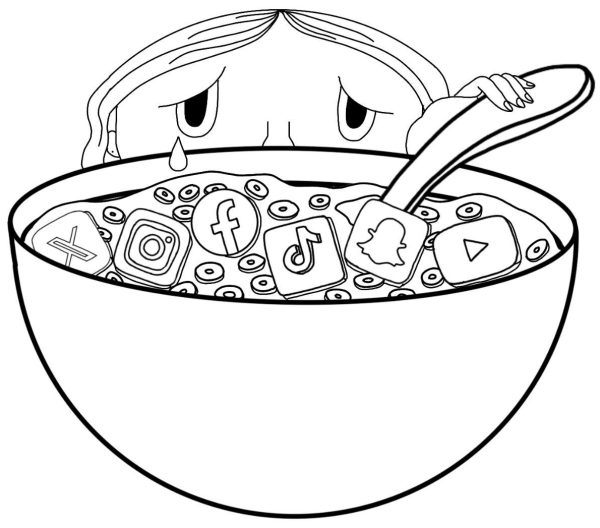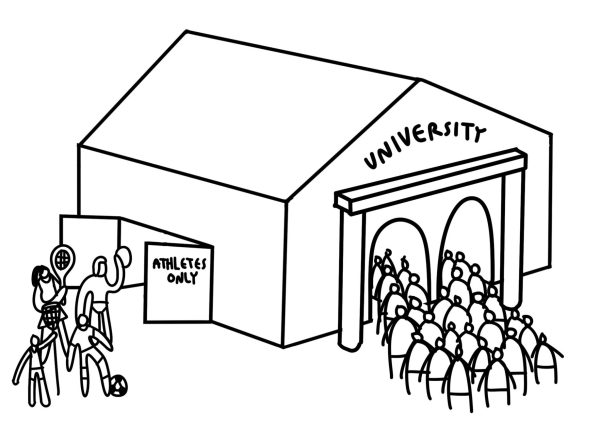Swapping medals for mental health

September 9, 2021
On July 27, news that American gymnast Simone Biles had dropped out of the team competition in the Olympic Games in Tokyo hit headlines across the globe. This came as a huge shock, as Biles is widely considered “the best female gymnast of all time.” After she announced that her decision to withdraw from the competition was due to mental health issues, many responded with overwhelming support, while others shamed her for being a ‘quitter’. This sparked a debate that has been brought up time and time again about the importance of mental health in sports. We need to stop pushing athletes past their mental capacity to achieve success in sports, and instead let them pause their athletic endeavors to prioritize mental health.
Although many were surprised by Biles’ withdrawal from the competition, this isn’t the first time we have seen Olympians, or any professional athlete for that matter, have the intensity of their sport negatively impact their mental health. Athletes for Hope, a nonprofit organization that provides mental health resources for athletes, reports that 35 percent of professional athletes suffer from mental health complications such as stress, eating disorders, depression and anxiety. Among these professional athletes, only a few, including Biles, have come forward about their struggles with mental health.
Back in 2016, American swimmer Michael Phelps was on his way to compete in his penultimate Olympic games. Just before the competition began, he spoke publicly about his struggles with mental health. He expressed that even though the title he holds as the most decorated and successful Olympian in history was, and still is, an enormous feat, the pressure that came along with it was unmanageable.
“I felt like I was carrying, like Simone said, the weight of the world on my shoulders. It’s a tough situation. …I hope this is an eye-opening experience,” Phelps said in an interview following Biles’ withdrawal.
Recently, just a few months before the Tokyo Olympics, U.S tennis player Naomi Osaka withdrew from the French Open due to mental health complications. Throughout her athletic career, Osaka has spoken openly about her battle with depression and anxiety. While she took a break from playing tennis, she worked to both improve and speak publicly about her mental health journey to positively influence others.
“Michael Phelps told me that by speaking up I may have saved a life,” Osaka said. “If that’s true, then it was all worth it.”
From 2016 to 2021, these Olympians, among many others, have been public about their mental health journeys. However, even though these Olympic athletes have broken the silence about mental health awareness in sports, it’s a deeply rooted issue found in all kinds of athletes.
Donovan Martin, a research facility supporting athletes with mental barriers in sports, found that student-athletes tested for higher levels of negative emotional conditions than non-student-athletes. An additional study published by Martin shows that nearly 25 percent of collegiate athletes have clinical levels of depressive symptoms. Based on the overwhelming reports from student, collegiate and Olympic athletes, it is clear that mental health issues among athletes is a widespread and systemic issue.
When I first saw the news about Biles, I resonated with it as I’ve watched friends suffer from the expectations set in the same sport of gymnastics for years, combating similar mental health complications. My mom is a gymnastics coach, and growing up I have watched many of her trainees struggle with the rigor and intensity of the sport. Many of these gymnasts became incredibly successful, some even going off to join the national team. However, each success came at a price, and many pushed their bodies and minds to their limits. Medals, awards and “wins” were achieved only by personal sacrifices, ultimately creating an unhealthy imbalance in their lives. Gymnasts were forced to choose between quitting the sport they grew up loving, or struggling mentally to keep up with demanding training and competition schedules.
As the topic of mental health in sports is being discussed more openly following Biles’ withdrawal from the Olympics, there has also been a movement of people criticizing her. Two popular commentators in the argument have been Charlie Kirk and Piers Morgan. Both commentators claim that their resentment towards her sprouts from her “lack of patriotism and strength.” On Kirk’s podcast, The Charlie Kirk Show, he said, “we are raising a generation of weak people like Simone Biles.” Like Kirk, Morgan also shared his dismay of Biles in a Tweet, writing, “sorry Simone Biles, but there’s nothing heroic or brave about quitting because you’re not having ‘fun,’ you let down your team-mates, your fans and your country.” Both Kirk and Morgan have created a pool of supporters following their views on Biles, however,others have scrutinized their criticism of her, rightfully so.
This immature and dehumanizing behavior directed towards Biles further proves that we need to stop shaming athletes who come forward about their struggles with mental illness, and rather provide support for their wellbeing before their athletic careers. Athletes are not invincible and may not be able to handle the immense pressure our society puts on them to win. Teaching athletes that they are allowed to advocate for their mental well-being over medals is the ultimate solution. Let’s start putting athletes’ mental health in “1st place.”






















